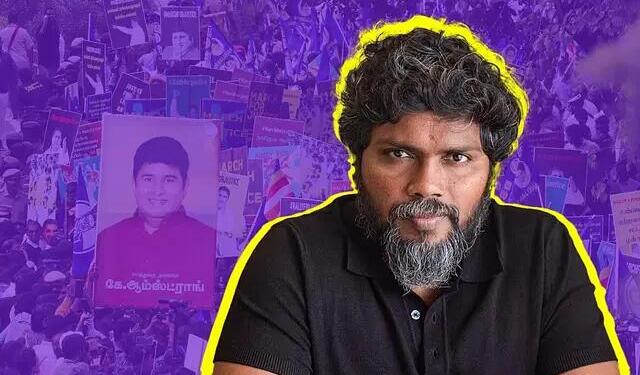The Dravida Munnetra Kazhagam’s (DMK) effective incorporation of Dalit leaders has limited the impact of filmmaker Pa Ranjith’s protests against Dravidian politics. Ranjith, a Dalit himself and director of the Rajinikanth-starrer Kabali, recently organized a rally in Chennai. The event aimed to demand a fair investigation into the murder of K Armstrong, the Bahujan Samaj Party’s (BSP) state president.
Dalit Representation in Tamil Politics
Ranjith urged elected Dalit leaders to speak up to those in power. This critique primarily targeted Dalit leaders within the ruling DMK and its ally, the Viduthalai Chiruthaigal Katchi (VCK). The VCK, led by Thol Thirumavalavan, is widely regarded as the state’s largest Dalit party.
Armstrong’s death sparked outrage, with Thirumavalavan supporting BSP chief Mayawati’s call for a Central Bureau of Investigation (CBI) probe. He also claimed that the state police had not arrested the real suspects. While this stance briefly embarrassed the DMK, the issue soon subsided, and the state police continued their investigation.
Obstacles for Ranjith’s Political Aspirations:
1. Cinema Industry Influence: The DMK’s strong hold over Tamil Nadu’s film industry, particularly through Chief Minister M K Stalin’s son Udhayanidhi Stalin’s Red Giant Movies, could create difficulties for Ranjith. As a filmmaker, his career could be impacted if he faces opposition from powerful industry players.
2. Established Dalit Leadership: Ranjith would likely face stiff competition from Thirumavalavan, who would fiercely defend his political territory. The VCK leader’s long-standing presence in Dalit politics gives him a significant advantage.
3. Controversial Statements: Ranjith’s provocative comments on Hinduism may alienate potential supporters who oppose Dravidian politics. His remarks about eating “their god” (referring to cows) and advocating for the distribution of Hindu mutt lands to Dalits have sparked controversy.
4. Fragmented Dalit Vote: The Dalit vote is divided among various groups with established loyalties. This fragmentation makes it challenging for new leaders to consolidate support across different Dalit communities.
DMK’s Dalit Outreach and Vote Bank Politics
The DMK has successfully incorporated different Dalit groups into its alliance, demonstrating its political acumen in managing diverse interests:
1. Parayars and Arunthathiyars: These major Dalit groups largely support the DMK alliance. The party has cultivated their loyalty through various welfare schemes and political representation.
2. Devendra Kula Vellalars (DKV): This group is split between the BJP, DMK, AIADMK, and Puthiya Tamizhagam. The division of DKV votes among multiple parties reflects the complex political landscape of Tamil Nadu.
3. Arunthathiyar Loyalty: The DMK secured their support by granting a 3% sub-quota within the Scheduled Caste quota. This move addresses the specific concerns of the Arunthathiyar community and strengthens their ties to the DMK.
4. Parayar Allegiance: This group remains loyal to the VCK and Thirumavalavan. The VCK’s alliance with the DMK ensures that Parayar support indirectly benefits the ruling party.
5. DKV and BJP: Some DKV members support the BJP after the party united several sub-castes under the DKV banner. This strategic move by the BJP demonstrates the importance of Dalit votes in Tamil Nadu’s political landscape.
DMK’s Dalit Leadership Strategy
The DMK excels at integrating Dalit leaders into its ranks. If necessary, Udhayanidhi Stalin could even portray a Dalit leader, as seen in the movie Mamannan, to boost the party’s image among Dalit voters. This approach showcases the DMK’s adaptability in addressing Dalit concerns and maintaining their support.
The Future of Dalit Politics in Tamil Nadu
As Dalit awareness and activism continue to grow, the political landscape in Tamil Nadu may evolve. While established parties like the DMK have successfully co-opted many Dalit leaders, voices like Pa Ranjith’s indicate a desire for more direct representation and addressing of Dalit issues.
However, for new Dalit leaders to emerge and challenge the status quo, they must overcome the hurdles of fragmented support, entrenched party loyalties, and the powerful influence of established political machineries. The success of such efforts will depend on their ability to unite diverse Dalit communities and present a compelling alternative to the current political arrangements.

























